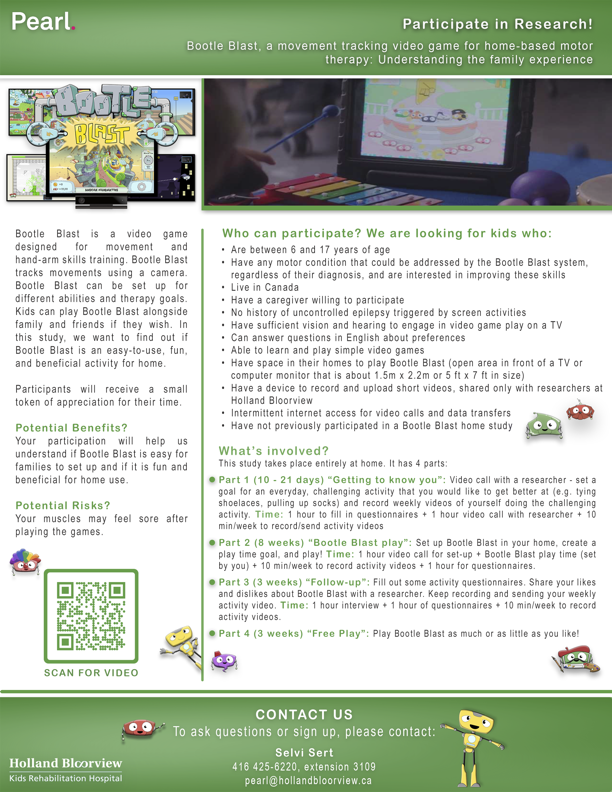New opportunities
The research studies listed below are looking for participants. Each study has received approval from a Research Ethics Board and Grandview Kids. Click on the study title to learn more about who can participate and what you’re asked to do.
Exploring the Experiences of Paediatric Home Care in Ontario Among Parents/Caregivers of Children with Complex Medical Conditions
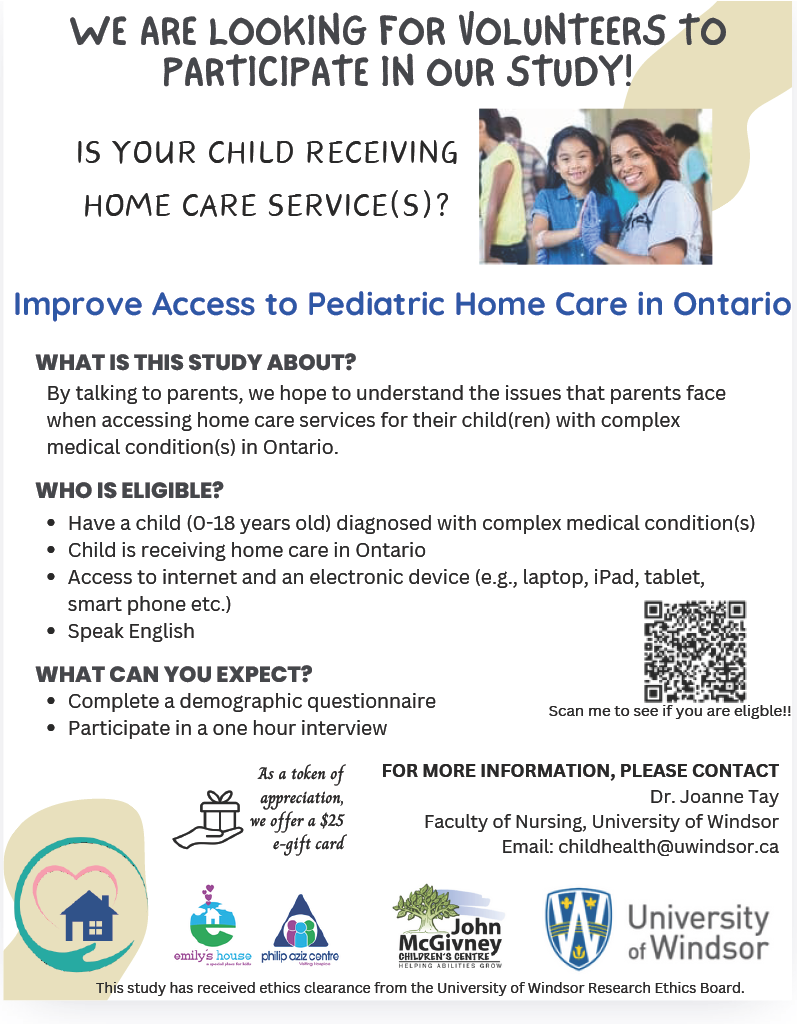
What is the purpose of this study?
The purpose of this study is to examine the challenges and barriers to accessing home care among parents/caregivers who have children with complex medical conditions in Ontario and to improve access to home care.
Who can participate?
Parents/caregivers can participate in this study if they:Speak English Are the primary caregiver of a child who is 0-18 years and is diagnosed with complex medical condition(s)Are parents/caregivers of a child who receives home care and requires care/supervision all dayHave access to an electronic device (e.g., smartphone, laptop, iPad, tablet) and internet Children with complex medical conditions who are in their end-of-life phase receiving home care will be excluded from this study and will not be asked to participate.
What is involved to participate in this study?
Parents/caregivers will participate in an interview that may range between 45 minutes to 1 hour.
What are the potential benefits to participants?
There are no direct benefits for parents who participate in this study; however, by participating, the parents are contributing to research that will assist in the learning of gaps in the delivery of home care services to the paediatric population. The findings from this study may help us find ways to improve the quality and delivery of home care services to children in their communities to better support parents in caring for their child(ren) at home.
What are the potential risks to participants?
There may be a low to moderate chance that the integrity and privacy of electronic records will be compromised. To minimize the potential for a breach of confidentiality, all questionnaire data will be stored securely in REDCap with password-protected, restricted user access. Questionnaires will also be de-identified by assigning a study ID. Recorded audio interviews will be encrypted and stored on the secure University of Windsor network and recordings will be destroyed as soon as the audio interviews are transcribed and de-identified with a study ID.
The risk present for all participants in this study is perceived to be low to moderate based on the University of Windsor’s research ethics board risk matrix. Parents who have a negative experience with home care services may be at risk of becoming emotionally distressed during the interview. Joanne Tay, the Principal Investigator (PI), is a registered nurse with several years of clinical experience in Paediatrics and can identify emotional distress. The PI will train the research assistants to identify and support emotional distress during an interview. If the participants become distressed, the PI or research assistant will pause the interview and provide in-the-moment support and then ask permission to continue the interview if appropriate.
If participants do not want to continue the interview, the PI/research assistant will ask for permission to return to the interview on another day. If a participant becomes acutely distressed, the PI/ research assistant will pause the interview and support the parent as needed.
Are there any incentives that will be provided to participants?
Each participant will receive a $25 e-gift card as appreciation to parents who participate in this research project.
Who should I contact if I am interested or if I have questions?
Dr. Joanne Tay, Associate Professor, Faculty of Nursing, University of Windsor
Email: childhealth@uwindsor.ca
Number: +1-(519) 253-3000
Motor skill intervention for children with Autism Spectrum Disorder: A 5-year follow-up
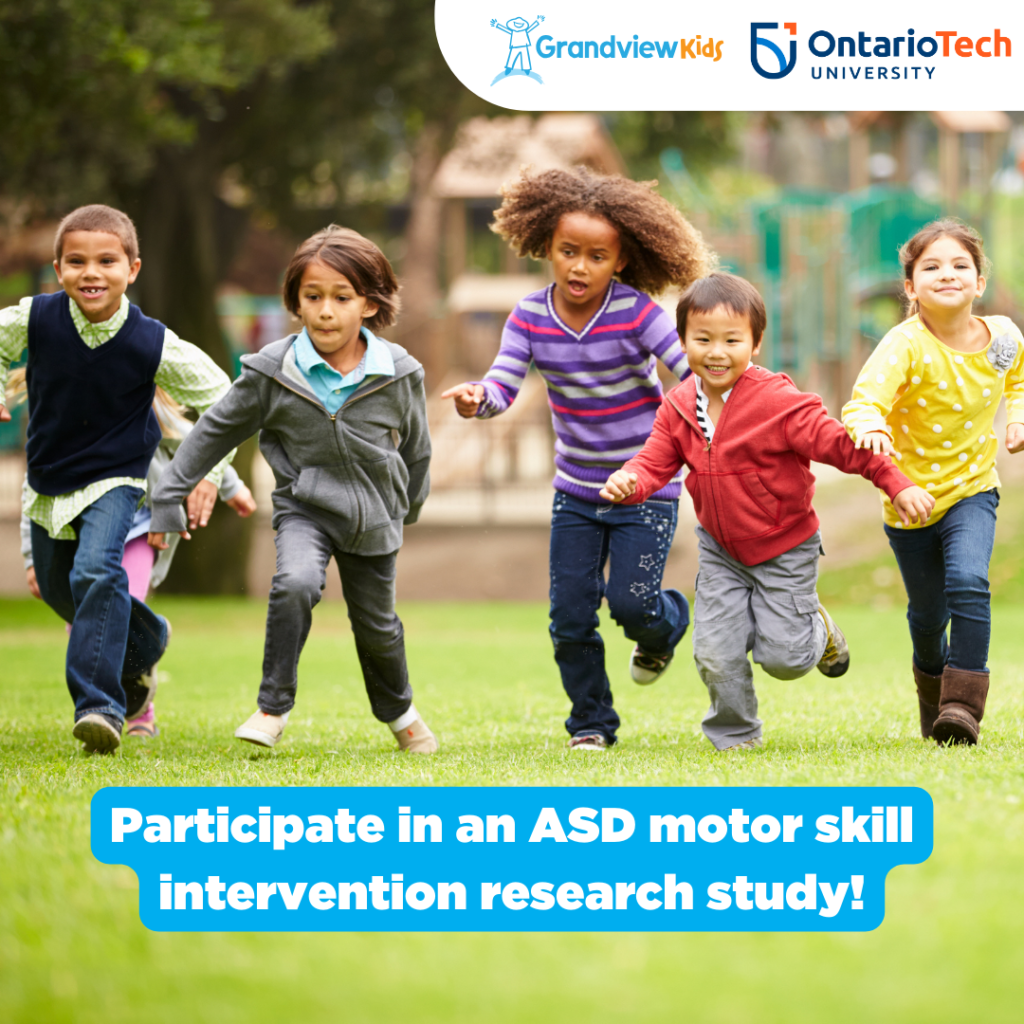
What is the purpose of this study?
The purpose of this study is to understand how motor skills and other developmental skills develop in children with Autism Spectrum Disorder (ASD). This is a 5-year follow-up study on a cohort of children with ASD who participated in a Social Sciences and Humanities Research Council (SSHRC) funded motor skill intervention between the years of 2017 to 2020. This study will also be recruiting a second group of children of similar age and sex, who did not receive the early motor skill intervention.
The previous study name is titled “Motor Skill Intervention for 3-5 year old Children with Autism Spectrum Disorder.”
Who can participate?
Children who are ages 8-10 years old and have a diagnosis of Autism Spectrum Disorder.
What is involved to participate in this study?
This study involves approximately 1 hour in-person at the Motor Behaviour and Physical Activity Lab at the Ontario Tech University campus. Children will demonstrate their motor skills and be video recorded. Parents will take home questionnaires to fill out at their convenience and return them in a pre-paid envelope. Children will be asked to wear accelerometers around their waist for 7 days (if tolerated) and return in the same envelope.
Families may be asked if they would like to participate in interviews at a later date. This is not mandatory.
What are the potential benefits to participants?
Participants will receive reports generated from the assessments involved in the study. For families who participated in the original study, it is another touchpoint with researchers.
What are the potential risks to participants?
There is no greater risk than playing on a playground, participating in physical education or other recreational activities. Data security is the highest priority and a fall data management plan has been approved by the Ontario Tech Research Ethics Board (REB).
Are there any incentives that will be provided to participants?
Each participant will receive a $50 gift card of their choice.
Parking will be provided at no cost.
Who should I contact if I am interested or if I have questions?
Dr. Meghann Lloyd
Associate Professor, Ontario Tech University
Research Associate at Grandview Children’s Centre
This study was approved on April 17, 2023, by Ontario Tech University’s Research Ethics Board (REB #17228), which is a committee of the university whose goal is to ensure the protection of the rights and welfare of people participating in research. The Board’s work is not intended to replace a parent/guardian or child’s judgment about what decisions and choices are best for you.
If you have any questions about your child’s rights as a research participant, you may contact:
Ontario Tech University’s Research Ethics Board
2000 Simcoe St. N., Oshawa, ON, L1H 7K4
905-721-8668, ext. 3693 or compliance@ontariotechu.ca
Funding Agency: Social Sciences and Humanities Research Council (SSHRC)
Recruitment End Date: April 2025
Bootle Blast, a movement-tracking video game for home-based motor therapy: Understanding the family experience
Bootle Blast is a video game designed for movement and hand-arm skills training. Bootle Blast tracks movements using a camera. Bootle Blast can be set up for different abilities and therapy goals. Kids can play Bootle Blast alongside family and friends if they wish. In this study, we want to find out if Bootle Blast is an easy-to-use, fun, and beneficial activity for home.
Participants will receive a small token of appreciation for their time.
Potential Benefits?
Your participation will help us understand if Bootle Blast is easy for families to set up and if it is fun and beneficial for home use.
Potential Risks?
Your muscles may feel sore after playing the games.
Who can participate? We are looking for kids who:
- Are between 6 and 17 years of age
- Have any motor condition that could be addressed by the Bootle Blast system, regardless of their diagnosis, and are interested in improving these skills
- Live in Canada
- Have a caregiver willing to participate
- No history of uncontrolled epilepsy triggered by screen activities
- Have sufficient vision and hearing to engage in video game play on a TV
- Can answer questions in English about preferences
- Able to learn and play simple video games
- Have space in their homes to play Bootle Blast (open area in front of a TV or computer monitor that is about 1.5m x 2.2m or 5 ft x 7 ft in size)
- Have a device to record and upload short videos, shared only with researchers at Holland Bloorview
- Intermittent internet access for video calls and data transfers
- Have not previously participated in a Bootle Blast home study
What’s involved?
This study takes place entirely at home. It has 4 parts:
- Part 1 (10 – 21 days) “Getting to know you”: Video call with a researcher – set a goal for an everyday, challenging activity that you would like to get better at (e.g., tying shoelaces, pulling up socks) and record weekly videos of yourself doing the challenging activity. Time: 1 hour to fill in questionnaires + 1 hour video call with researcher + 10 min/week to record/send activity videos
- Part 2 (8 weeks) “Bootle Blast play”: Set up Bootle Blast in your home, create a play time goal, and play! Time: 1 hour video call for set-up + Bootle Blast play time (set by you)+ 10 min/week to record activity videos+ 1 hour for questionnaires.
- Part 3 (3 weeks) “Follow-up”: Fill out some activity questionnaires. Share your likes and dislikes about Bootle Blast with a researcher. Keep recording and sending your weekly activity video. Time: 1 hour interview+ 1 hour of questionnaires + 10 min/week to record activity videos.
- Part 4 (3 weeks) “Free Play”: Play Bootle Blast as much or as little as you like!
Measure of Processes of Care (MPOC) 2.0 – Towards the new gold standard in measuring family-centred service: Field-testing the new MPOC 2.0
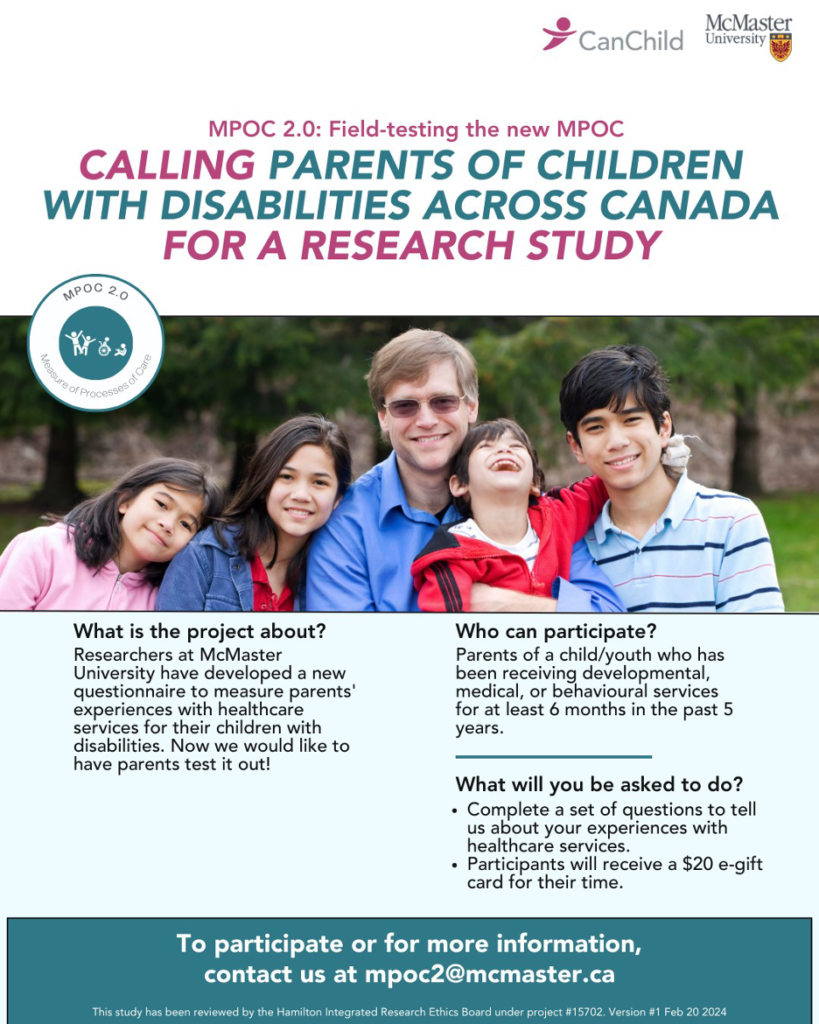
What is the purpose of this study?
The purpose of this study is to develop an up-to-date tool that will accurately measure caregivers’ experiences of the delivery of pediatric healthcare services. Researchers want to learn about caregivers’ experiences with the way health care services are delivered in the present day, based on what they report they need, want and expect from these services.
Who can take part?
- Parents of child/youth who has been receiving developmental, medical, service navigation or behavioural services for at least 6 months in the past 5 years.
- Parents who have not previously participated in another phase of the MPOC 2.0 study
What is involved?
If you decide to be in the study, you will be asked to complete a set of questions about your experiences with healthcare services. Participants will receive a $20 gift card for completion of the questionnaires.
What are the potential benefits to participants?
There are no direct benefits to the participants beyond your contribution to research and the development of this new tool which researchers hope will be adopted widely throughout care provider organizations.
What are the potential risks to participants?
Asking participants about their healthcare experiences might bring up unpleasant or distressful memories.
Who should I contact if I am interested?
Contact the MPOC 2.0 research team at mpoc2@mcmaster.ca
Researcher(s): Dr. Peter Rosenbaum, Professor of Paediatrics, McMaster University
Funding Agency: Canadian Institutes of Health Research (CIHR)
Recruitment Deadline: August 31, 2024.
Discrimination, ableism and racism hurt, but inclusion can heal: Listening to the intersectional lived experiences of youth with disabilities and co-creating solutions [Youth Interview]
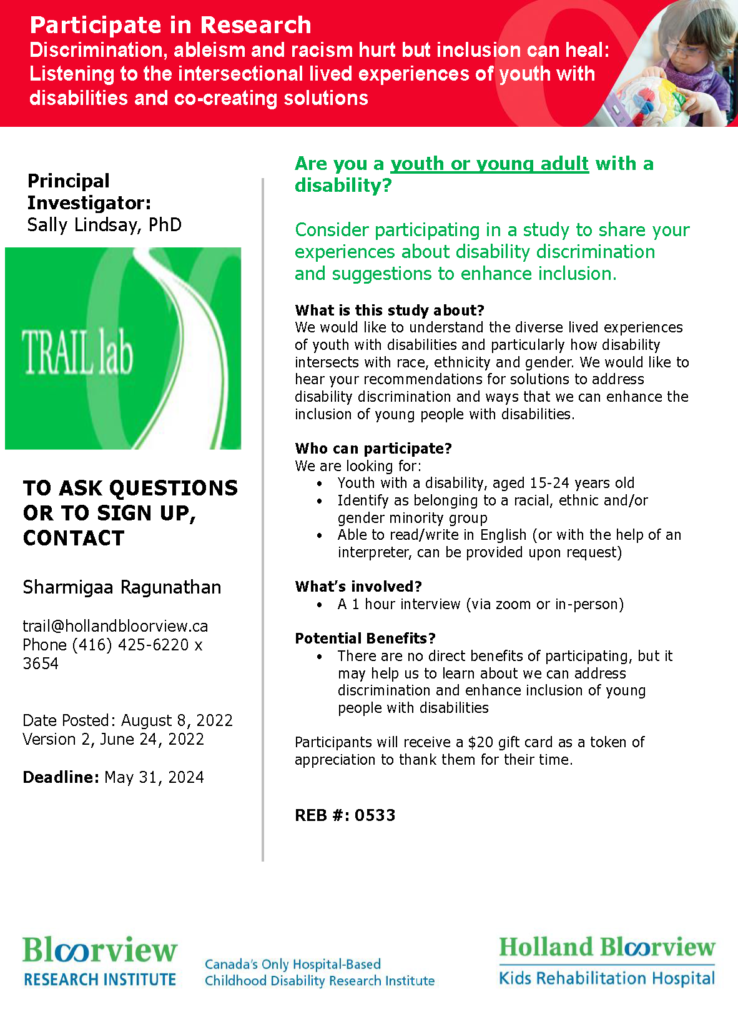
What is the purpose of this study?
This study aims to (1) to explore the diverse lived experiences of youth with disabilities and the intersection of disability with race, ethnicity and gender; and (2) to explore the causes and persistence of systemic discrimination, racism and ableism experienced by youth with disabilities.
Who can participate?
You can participate in this study if you are:
- Youth with a disability
- Aged 15-24 years old
- Identify as belonging to a racial, ethnic or gender minority group
- Able to communicate in English or with the help of an interpreter (can be provided by the study upon request)
What is involved?
If you decide to be in the study, you will be asked to take part in a 1-hour interview. The interview will take place over the phone, via zoom or in person (it is your choice).
Participants will receive a $20 gift card (e.g. Tim Hortons) or a letter for volunteer hours.
What are the potential benefits to participants?
Potential benefits may include sharing perspectives on strategies to reduce discrimination and enhance the inclusion of people with disabilities. We hope the information participants share will have a positive impact on attitudes toward people with disabilities. We hope that the information learned from this study can be used in the future to help other people.
What are the potential risks to participants?
The potential risks in this study are minimal. It is possible that some of the questions in the interview may cause feelings of discomfort. During the interview some of the questions we ask of participants may make you feel worried, stressed and/or sad or upset. If this happens, participants may skip questions, take a break or stop answering at any time. This does not include any other parts of the study participants decide to participate in.
If participants’ answers show us that there is a serious risk of harm to themselves or other people, we will have to tell somebody about it. We will do this to protect the participant or another person. If we feel that the participant needs help right away because they took part in this research we will work with trained staff to get the participant the help that you need.
Who should I contact if I am interested?
Sharmigaa Ragunathan: trail@hollandvbloorview.ca, 416-425-6220 ext. 3635
Researcher(s): Sally Lindsay, Bloorview Research Institute – Holland Bloorview Kids Rehabilitation Hospital
Funding Agency: Social Sciences and Humanities Research Council (SSHRC) and Holland Bloorview Kimel Family Opportunities fund
Recruitment Deadline: May 2024
Childhood Cerebral Palsy Integrated Neuroscience Discovery Network (CP-NET) – Clinical Database Platforms
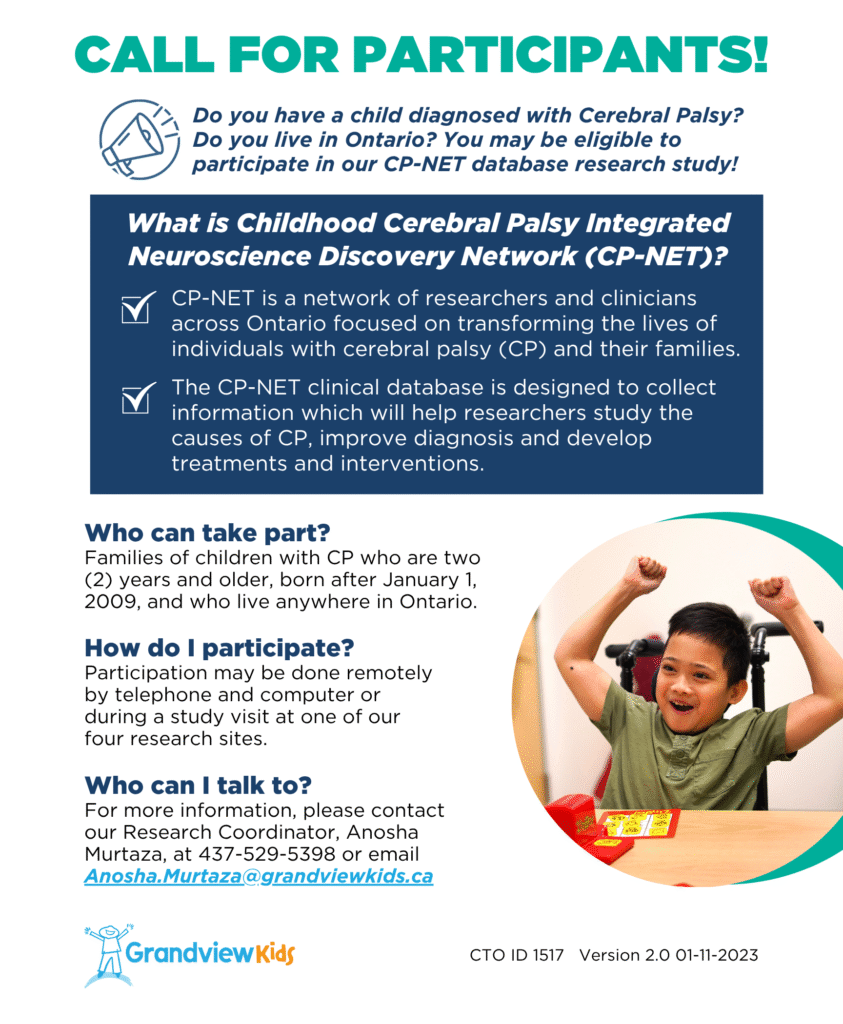
Have you or your child been diagnosed with Cerebral Palsy (CP)? If so, consider participating in our research study.
You are being invited to participate in a study that involves building an Ontario Cerebral Palsy (CP) Clinical Database called “CP-NET.” You are invited to participate in this study because you are/have a child who has a diagnosis of CP. The purpose of this project is to store a lot of information about children with all sub-types of CP. This way, researchers and clinicians can try to understand better what causes cerebral palsy and develop treatments and therapies that work in the future.
What’s involved?
Participants will attend three research sessions. The first session occurs shortly after they consent to participate, the second session occurs one year after the first session, and the third session occurs one year after the second session. During these sessions, saliva will be collected from the child and their parents, parents will be asked to complete an interview and some questionnaires and medical records of the child and birth mother (if available) will be requested for review. This will take approximately 1.5-2 hours, and the second and third sessions will take about 30 minutes each. All sessions can be completed on-site or remotely. Forms and other research materials can be mailed to participants’ homes with a return postage stamp to return materials.
Who can participate?
Children aged 2 or more born after Jan 1, 2009, who have CP are invited to participate in CP-NET. Recruitment is ongoing.
Why should you consider participating?
Your participation will enable researchers to study the causes of CP, identify risk factors and develop treatments and interventions to improve outcomes and care for children with CP. Participants will receive a $20 gift card and be reimbursed for parking/public transport at each session if required.
Contact Information
If you are interested in participating in this study or have additional questions, please contact our Research Coordinator, Anosha Murtaza, at 437-529-5398 or email Anosha.Murtaza@grandviewkids.ca with your interest, and she will get back to you. Contacting us does not obligate you or your child to participate in the study.
Study expires: 2028
Province of Ontario Neurodevelopment Disorders-Network (POND-Network)
Holland Bloorview Kids Rehabilitation Hospital Autism Research Centre and the POND-Network are currently conducting new research studies across Ontario to understand how genes and biology affect the brain and behaviour in Autism and other Neurodevelopmental Disorders.
What’s involved?
Please contact Susan Day Fragiadakis (see below) for detailed information on current studies.
Who can participate?
Children 21 years or younger who have a Neurodevelopmental disorder (e.g., ASD, Intellectual Disability, Rett Syndrome or Fragile X, Down Syndrome, Anxiety Disorder) and typically developing children between the ages of 3 – 21 years.
Why should you consider participating?
By participating you are helping researchers understand how genes affect the brain, body, and behavior, and then translate this understanding into new ways to help individuals with autism and associated neurodevelopmental disorders.

Contact Information
Susan Day Fragiadakis
(416) 425-6220 ext. 6518
sfragiadakis@hollandbloorview.ca
Information updated: August 29, 2017
Study expires: March 31, 2021
